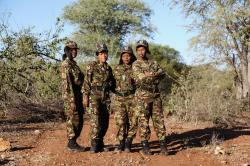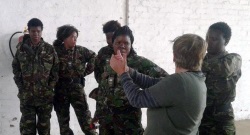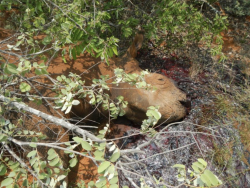RAGES (Rotary Action Group for Endagered Species) has added a new project.
Deb Mair, Hutt City Rotarian and South East Asia Director brings us this fantastic new story.
 An all female, anti poaching team using a boots on the ground philosophy to save rhinos and wildlife in Africa.
An all female, anti poaching team using a boots on the ground philosophy to save rhinos and wildlife in Africa.The Black Mambas anti-poaching strategy includes ‘visual policing’ through daily boundary patrols which are conducted on foot during first light and by vehicle at last light. Observation and listening posts are stationed in critical areas such as known entry and exit points or popular rhino waterholes for signs of poisoning. Disruptive patrols are performed within areas of high rhino density to thwart any attempts to poach rhino in our area. Road Blocks involve searching know and unknown vehicles for any illegal or suspicious items.
They are an unarmed unit who have a vision to conserve and protect the rhino species and other animals on their land which will ensure sustainability and responsible tourism growth whilst protecting the environment and biodiversity of the reserve.
The primary mission of the APU is to detect the presence of poachers and sound the alarm. An outside professional armed rapid response unit is on call per contract with OWNR once the Black Mambas detect an eminent threat.
 Deb spent a week training the Mambas in detaining, arresting & searching procedures as well as testing them in field scenarios where OC Spray and handcuffing was techniques were used. It is hoped that Club donations will contribute to the continued training and development of the Mambas. This project has saved lives, protected wildlife, employed locals and educated our future generations through the school Bush Babie Program.
Deb spent a week training the Mambas in detaining, arresting & searching procedures as well as testing them in field scenarios where OC Spray and handcuffing was techniques were used. It is hoped that Club donations will contribute to the continued training and development of the Mambas. This project has saved lives, protected wildlife, employed locals and educated our future generations through the school Bush Babie Program.The Black Mamba Project has given these women mentor roles in their communities and established them as the main income provider at home. They are currently a hot commodity with worldwide television networks filming and documenting their contribution to South African wildlife, the environment and their impact on reducing crime. They won the 2015 UN Rhino  Conservation Award and a 2017 Eco-logical Award from Enviropaedia.
Conservation Award and a 2017 Eco-logical Award from Enviropaedia.
 Conservation Award and a 2017 Eco-logical Award from Enviropaedia.
Conservation Award and a 2017 Eco-logical Award from Enviropaedia. The objectives of the Black Mamba Project (supported by RAGES) are not only the protection of rhinos through boots on the ground but also through being a role model in their communities. These 36 young women and 2 men want their communities to understand that the benefits are greater through rhino conservation rather than poaching, addressing the social and moral decay that is a product of the rhino poaching within their communities. They are concerned for their children’s sake as the false economy has brought loose morals, drinking and narcotics into their communities. Watch a YouTube video here to know more - https://youtu.be/ePwaOq0ZdZc
The Bush Babies Education Program ran by the Black Mambas is interlinked into the curriculum of 10 local schools to bring knowledge to life whilst raising awareness about their surrounding environment, providing a better understanding of conservation and leading to sustainable use of resources and ultimately installing an ethical ethos in our future generations.
 The rapid rise in rhino poaching has been driven by an exponential increase in the illegal demand and black market price for rhino horn in south east Asia, especially Vietnam and China. Poaching of Africa's rhinos has escalated exponentially from an average loss of 0.17 rhinos per day (a total of 62 rhinos) in 2007, to 2.04 rhinos per day (a total of 745 rhinos) in 2012 up to 945 in 2016. Rhino horn is nearly pure keratin, the same organic composition as human finger nail or hair (Hieronymus, Witmer, & Ridgely, 2006).
The rapid rise in rhino poaching has been driven by an exponential increase in the illegal demand and black market price for rhino horn in south east Asia, especially Vietnam and China. Poaching of Africa's rhinos has escalated exponentially from an average loss of 0.17 rhinos per day (a total of 62 rhinos) in 2007, to 2.04 rhinos per day (a total of 745 rhinos) in 2012 up to 945 in 2016. Rhino horn is nearly pure keratin, the same organic composition as human finger nail or hair (Hieronymus, Witmer, & Ridgely, 2006).